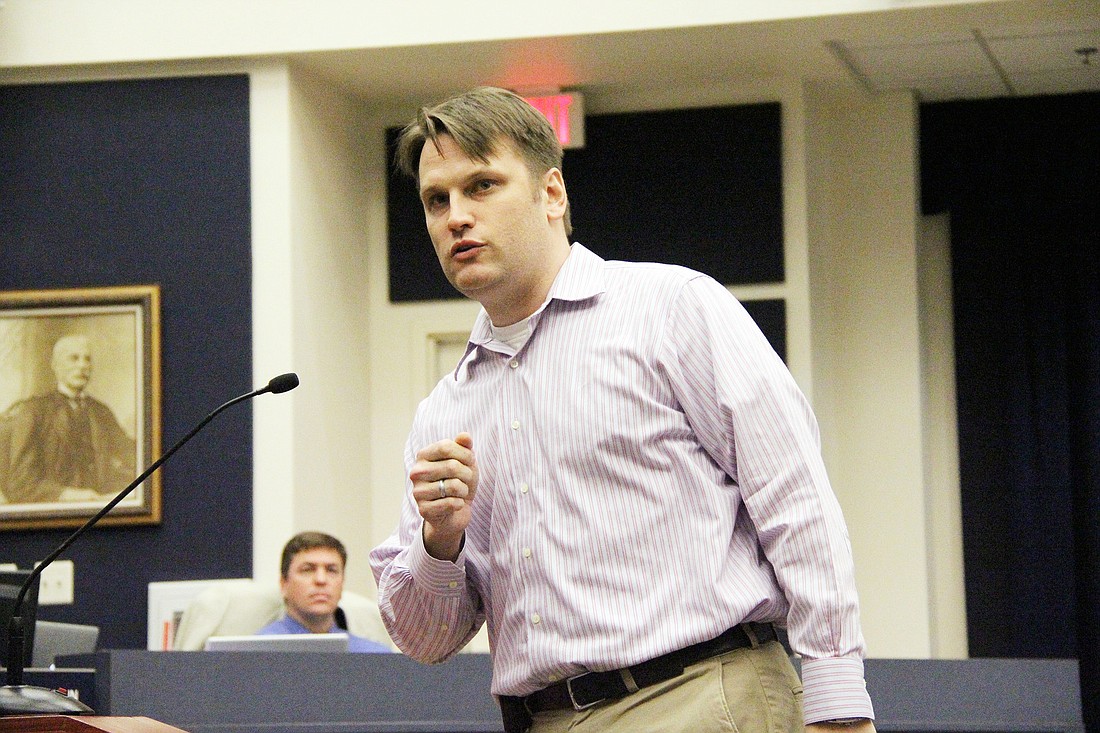- May 4, 2024
-
-
Loading

Loading

School Board Chairwoman Sue Dickinson was the deciding vote in approving a districtwide uniforms policy in Flagler schools.
Sorry, kids, but it’s official.
By a vote of 3-2 Tuesday, the Flagler County School Board approved a districtwide uniforms policy to launch at the beginning of the 2012-2013 school year. A workshop is scheduled Wednesday, Jan. 25, to decide dress-code specifics, which might, if modeled after Osceola County’s policy, require belts, collared shirts, and allow unripped jeans and different colored tops.
Since October, the board has held four workshops on the policy, initially proposed by Board member John Fischer, as well as a town-hall meeting and a community forum. It also conducted teacher, parent and faculty surveys to measure support.
As has been the case with most other uniform meetings, residents were given a chance to respond to the proposition at Tuesday night’s final gathering, and they did so passionately.
Some parents cited a loss of control over what their kids wear; others cited the cruelty of children who tease “uncool” clothes.
Young students cited their creative rights of expression, and older students their rights as individuals and adults.
And there was even a student or two who backed the policy (“All the kids are a lot more respectful, and everybody’s nicer,” one young boy said).
Katie Hanson, teachers union president, said that uniforms could possibly spur a “life-changing” unintended consequence.
If a student repeatedly violates the dress code, he would repeatedly be sent the principal’s office and miss her lessons, she said, which would reflect badly on not only his grade but, according to the district’s new performance-based pay model, possibly her salary. (See “Race to the Top,” on Page 1A.)
Another parent wondered why, if uniforms are so effective, would the School Board have to close the Heritage Academy, a uniform-mandatory charter school, for receiving two consecutive years of failing grades. (See “Heritage,” Page 1A.)
But at the end of the day, the vote was cast in favor of a mandatory uniforms policy.
“I believe that this is something that’s good for our community,” Fischer told the board, before a vote was cast. “Sometimes we have to make decisions that are not popular.”
Colleen Conklin agreed. “I’ve been on the fence in regard to the cost … but I’m very much in favor (of) the positive effects,” she said, citing statistics, safety, morale and school culture. “Will uniforms take care of all our discipline issues? No, they won’t. But they really need to be part of a comprehensive approach.”
Trevor Tucker, a self-proclaimed “numbers guy” and one of the quieter board members, was the first to speak up, and he did so in opposition.
“We cannot use tax dollars for those who cannot afford to use uniforms, and this is my big hang-up,” he said. For example, he said, if 10% of the student body require aid, that’s 1,300 uniforms the district has to supply. Osceola, whose uniform structure has been modeled by the School Board, gets most of its extra clothing from private donations.
But what if Flagler can’t muster the same support? Tucker asked.
“I see this can hurt sports or other programs,” he said, reasoning that if companies or residents already donate once to the district, they might not donate twice.
Dickinson felt it would actually make more financial sense to switch to uniforms for students in need.
Under the new policy, she said, “it’s going to be cheaper for the The S.T.U.F.F. BUS to clothe these kids.”
Vice-chair Andy Dance seconded Tucker, pointing to the already-overworked nonprofit groups that donate time and money to feed and clothe the county’s poor.
“We still have a ton of serious issues that are put before us,” he said, calling uniforms, by comparison, “trivial.”
He continued: “I think we’re doing a disservice to our community by pulling resources from those basic functions and putting them into clothing.”
Although the specifics of the uniforms are uncertain — the Osceola uniform policy is more of a strict dress code — Flagler County will be a uniformed school district come the fall semester.
THE BOARD SAYS:
John Fischer — YEA
“(Uniforms) are not a punishment, but a support.”
Colleen Conklin — YEA
“I look at this as doing … families who are facing economic hardship ... a favor.”
Trevor Tucker — NAY
“In order to enforce this, we have to enforce it across the board. … Who’s going to pay for these uniforms? … If we don’t get enough private donations, are we going to turn these kids away?”
Andy Dance — NAY
“Whether it’s a good policy or bad, it’s just the wrong time to be having the conversation on this issue.”
Sue Dickinson — YEA
“It’s going to be cheaper for The S.T.U.F.F. BUS to clothe these kids.”
DRESS CODE MALFUNCTION
According to School Board staff, 1,047 referrals have been issued to students in the past three years for dress-code violation.